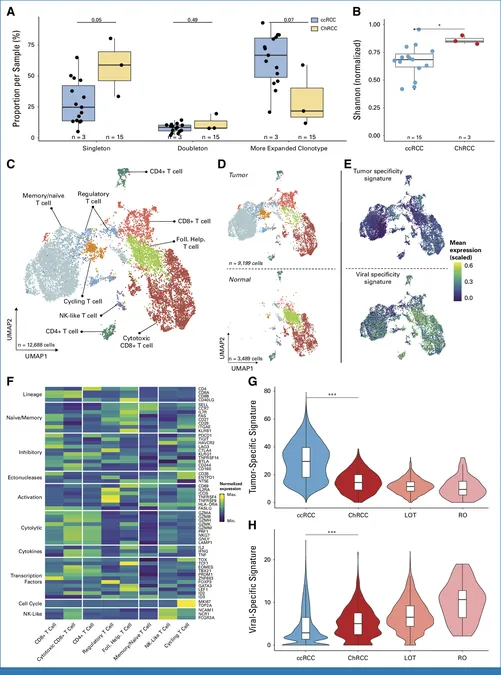
Unveiling the Secrets of Chromophobe Renal Cell Carcinoma: Why Immune Therapies Fail
2025-07-03
Author: Jia
A groundbreaking study has revealed that chromophobe renal cell carcinoma (ChRCC), a rare form of kidney cancer, poses a unique challenge for treatment due to its scarcity of active T-cells, the body's main defenders against tumors. This devastating finding underscores an urgent need for novel therapeutic strategies.
Published on July 2 in the Journal of Clinical Oncology, the research explores the perplexing biology of ChRCC, which makes up roughly 5% of all kidney cancer cases. The study highlights a pattern: ChRCC tumors harbor far fewer T-cells and essential immune molecules compared to other more common kidney cancers, resulting in a poor response to existing immune-based treatments.
The Challenge of Chromophobe Renal Cell Carcinoma
According to Dr. David Braun from Yale Cancer Center, "Chromophobe renal cell carcinoma remains a major clinic challenge. Current treatments were designed for other kidney cancer types and fail to address the distinctive immune characteristics of this rare variant." This indicates a pressing need for therapies tailored specifically for ChRCC.
The research was spearheaded by a team of esteemed specialists, including Dr. Elizabeth P. Henske from Brigham and Women's Hospital, Dr. Toni K. Choueiri from Dana-Farber Cancer Institute, and Dr. Eliezer M. Van Allen from the same institute, along with Dr. Sachet Shukla from MD Anderson Cancer Center. The lead author, Dr. Chris Labaki, now affiliated with Beth Israel Deaconess Medical Center, was joined by a collaborative network of researchers in the U.S. and Canada.
Insights from Advanced Machine Learning Analysis
Utilizing cutting-edge machine learning techniques, the study conducted an in-depth analysis of individual cells from both ChRCC tumors and normal kidney tissue. This work revealed that ChRCC tumors originate from specific kidney cells called α-intercalated cells and uncovered distinct gene activity that differentiates these tumors from their normal counterparts.
Moreover, researchers employed single-cell sequencing to investigate immune cells within ChRCC tumors, exposing the mechanisms by which cancer cells evade the immune system's detection.
The Need for Innovative Therapeutic Strategies
While more typical forms of kidney cancer often present numerous immune cells that, although 'exhausted,' remain capable of detecting tumor cells, ChRCC operates under a different paradigm. Dr. Braun emphasized, "For ChRCC, the immune evasion process is completely unique. We need therapeutic approaches that actively recruit cancer-specific immune cells into the tumor environment."
While promising insights have emerged from this study, limitations such as sample size have been acknowledged, emphasizing the need for additional research to unlock further therapeutic avenues for this challenging cancer type.

 Brasil (PT)
Brasil (PT)
 Canada (EN)
Canada (EN)
 Chile (ES)
Chile (ES)
 Česko (CS)
Česko (CS)
 대한민국 (KO)
대한민국 (KO)
 España (ES)
España (ES)
 France (FR)
France (FR)
 Hong Kong (EN)
Hong Kong (EN)
 Italia (IT)
Italia (IT)
 日本 (JA)
日本 (JA)
 Magyarország (HU)
Magyarország (HU)
 Norge (NO)
Norge (NO)
 Polska (PL)
Polska (PL)
 Schweiz (DE)
Schweiz (DE)
 Singapore (EN)
Singapore (EN)
 Sverige (SV)
Sverige (SV)
 Suomi (FI)
Suomi (FI)
 Türkiye (TR)
Türkiye (TR)
 الإمارات العربية المتحدة (AR)
الإمارات العربية المتحدة (AR)